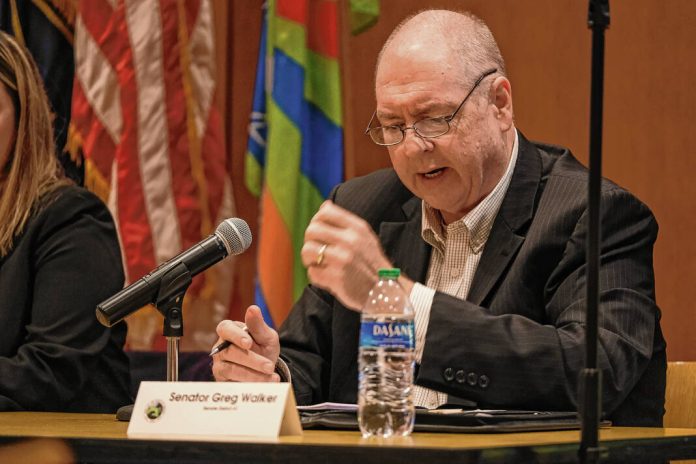
Mike Wolanin | The Republic State Sen. Greg Walker takes part in a Legislative Preview Lunch organized by the Columbus Area Chamber of Commerce at Columbus City Hall in Columbus, Ind., Monday, Dec. 11, 2023. The legislators discussed issues facing the state and what they hope to accomplish in the upcoming short legislative session.
Two state lawmakers from Bartholomew County identified bills on education and child welfare as their top priorities in the recently ended session of the Indiana General Assembly.
Sen. Greg Walker, R-Columbus, chairs the Senate Family and Children Services Committee, while Rep. Ryan Lauer, R-Columbus, is a majority member of the House Family, Children and Human Affairs Committee.
“This session has been so positive with significant legislation that will better protect vulnerable children,” Lauer said.
One example is House Bill 1310, written by Lauer and sponsored in the Senate by Walker. The measure involves children who have been removed from their parent for at least 12 of the most recent 22 months.
Lauer says the bill will give abused and neglected children alternatives to being returned to an unhealthy environment. Those options include adoption and foster care.
“I think the bill did a great job of striking a balance between the priority of the state to see that all children are in a safe and loving environment, and preserving parent’s rights,” Walker said.
Lauer’s bill was approved by both legislative chambers and signed into law March 11 by Indiana Gov. Eric Holcomb.
Walker was the co-author of Senate Bill 171, which amends the circumstances under which reasonable efforts to reunify a child with the child’s parent, guardian, or custodian to preserve a child’s family is not required.
“There are a number of circumstances where (reunification of child and parent) just doesn’t make sense,” said Lauer, who co-sponsored the bill in the House. Three circumstances specifically mentioned are when a parent is a sex offender, a parent has sexually abused the child or if the child has been removed from a home at least twice for abuse or neglect, Lauer said.
Holcomb signed Senate Bill 171 into law on March 11.
Reading retention
Senate Bill 1 addressed students’ reading skills. Walker said Senate Bill 1 tightens the state’s policy for holding back and remediating young children who don’t demonstrate reading proficiency by third grade.
Lauer says the 2020 pandemic, which had an adverse effect on the reading skills of children, requires that efforts be made to get children up to speed on reading. Most of the policies in this bill deal with children in third grade and younger.
There are options other than retention. The bill calls for coaches and programs focused on reading, as well as summer school, Lauer said.
But Walker says he still has reservations regarding retention, adding more research is needed on other factors that caused reading skills to drop.
Holcomb signed the bill into law March 11.
Higher education
Senate Bill 202 would require colleges and universities to establish policies around free inquiry, free expression, and intellectual diversity by faculty.
But a number of lawmakers say they want to use this measure to ensure conservative and Republican views can be expressed and discussed in college classrooms.
The bill requires university boards of trustees to establish policies that prevent faculty from receiving tenure or promotions if they have not encouraged “free expression” and intellectual diversity,” or if they teach students political views unrelated to their discipline.
It would also require tenured professors to undergo a review every five years. Boards of trustees could prevent a faculty member from being tenured or promoted if there are concerns they are unlikely to allow “intellectual diversity” or content from other “political or ideological frameworks.”
Republican lawmakers say it’s necessary because Republican and conservative students don’t feel comfortable inside Indiana college classrooms. Democrats and others opposed to the bill say it is another attempt to dismantle diversity, equity and inclusion efforts, as well as to silence and punish faculty who research and teach controversial and complex topics.
“There is criticism that (Senate Bill 202) respects one side of the political spectrum over the other,” Walker said. “Neutrality is what I’d prefer. I supported the bill, but I’m kind of holding my breath a little bit to see how people react to it.”
In testimony given at the statehouse, critics said the bill would hurt the recruitment of diverse faculty and students to Indiana higher education institutions. One person said the measure poses grave risks to university faculty and tenured professors.
An amended version of the bill passed the Senate 33-12 on the last day of February, and is now pending with Holcomb.
Safe baby court
Another bill authored by Lauer was House Enrolled Act 1101, which establishes a safe baby court as a new type of problem solving court for children ages 3 and younger. Already implemented in other U.S. communities, the safe baby court would bring together all parties involved with infants and toddlers determined to be in need of services.
The court will pave the way for permanency decisions to be made more quickly, for providing services to certain dysfunctional families, and also allows judges to ensure that guardians are doing what’s best for the child, Lauer said.
Signed by Holcomb on March 11, the bill goes into effect July 1.
Child care
Many Hoosier families will be impacted by Senate Bill 2, Walker said. The measure reduces the minimum age to work in infant and toddler child care rooms to 18, and the age for taking care of school-age children to 16.
“It raises some of the ceilings on income levels and other perimeters that makes child care more accessible in the state,” Walker said.
In a bill meant to work hand-in hand with that measure, Walker co-sponsored House Bill 1102, which sets the number of children under 12 months of age that may be looked after in a child care home. The bill also provides that certain child care programs are exempt from licensure. It would also make certain child care providers eligible for voucher payment, Walker said.
”I hope it expands the capacity of our existing child care network,” Walker said. House Bill 1102 was signed into law by Indiana Gov. Eric Holcomb on March 13.
Other bills
Apart from children and education, Walker and Lauer expressed support of House Bill 1004, which provides an extra (13th) check to retired public employees and teachers. The extra money is needed in light of inflation, Walker said. It was signed into law March 13.
Lauer lauded House Bill 1183, which bars entities affiliated with China, Cuba, Iran, North Korea, Russia and Venezuela from acquiring or renting agricultural land. The measure also prohibits foreign adversaries from purchasing and leasing land within in a 10-mile radius of a military installation.
The bill, which passed overwhelmingly in both the House and Senate, is awaiting Holcomb’s signature.




